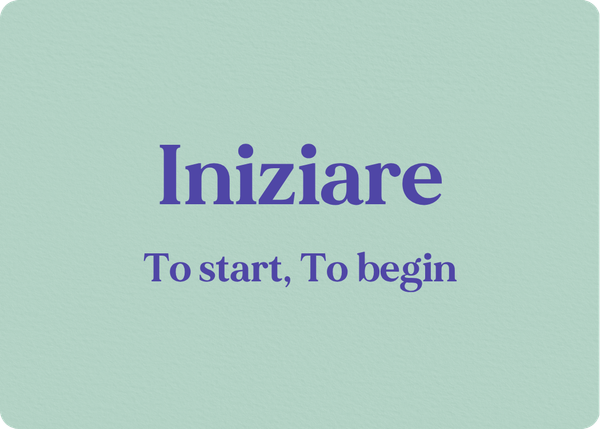What is Sentire?
Sentire is an Italian verb meaning "to hear", "to feel", "to smell", or "to taste". It belongs to the third conjugation (-IRE verbs) and follows regular conjugation patterns. This verb is useful for expressing sensory perceptions, emotions, and physical sensations.
Key Features of Sentire:
- Type: Regular third conjugation verb (-IRE)
- Meaning: To hear, to feel, to smell, to taste, to sense
- Auxiliary verb: Uses "avere" (to have) for conjugation in compound tenses
- Past participle: Sentito
Indicativo – Indicative Mood
Presente (Present Tense)
| Person | Conjugation |
|---|---|
| io | sento |
| tu | senti |
| lui/lei | sente |
| noi | sentiamo |
| voi | sentite |
| loro | sentono |
Example:
Sento la musica dalla stanza accanto.
I hear the music from the next room.
Passato Prossimo (Present Perfect)
| Person | Conjugation |
|---|---|
| io | ho sentito |
| tu | hai sentito |
| lui/lei | ha sentito |
| noi | abbiamo sentito |
| voi | avete sentito |
| loro | hanno sentito |
Example:
Ho sentito molto parlare di te.
I've heard a lot about you.
Imperfetto (Imperfect)
| Person | Conjugation |
|---|---|
| io | sentivo |
| tu | sentivi |
| lui/lei | sentiva |
| noi | sentivamo |
| voi | sentivate |
| loro | sentivano |
Example:
Mia nonna sentiva freddo anche in estate.
My grandma felt cold even in the summer.
Trapassato Prossimo (Past Perfect)
| Person | Conjugation |
|---|---|
| io | avevo sentito |
| tu | avevi sentito |
| lui/lei | aveva sentito |
| noi | avevamo sentito |
| voi | avevate sentito |
| loro | avevano sentito |
Example:
Non avevo mai sentito una voce bella come la tua.
I had never heard a voice as beautiful as yours.
Passato Remoto (Simple Past)
| Person | Conjugation |
|---|---|
| io | sentii |
| tu | sentisti |
| lui/lei | sentì |
| noi | sentimmo |
| voi | sentiste |
| loro | sentirono |
Example:
Sentii un grido terribile e corsi fuori.
I heard a terrible scream and ran outside.
Trapassato Remoto (Past Anterior)
| Person | Conjugation |
|---|---|
| io | ebbi sentito |
| tu | avesti sentito |
| lui/lei | ebbe sentito |
| noi | avemmo sentito |
| voi | aveste sentito |
| loro | ebbero sentito |
Example:
Quando ebbe sentito quelle parole, il suo cuore si riempì di gioia.
When he had heard those words, his heart filled with joy.
Futuro Semplice (Simple Future)
| Person | Conjugation |
|---|---|
| io | sentirò |
| tu | sentirai |
| lui/lei | sentirà |
| noi | sentiremo |
| voi | sentirete |
| loro | sentiranno |
Example:
Domani sentirò il parere del medico.
Tomorrow I will hear the doctor's opinion.
Futuro Anteriore (Future Perfect)
| Person | Conjugation |
|---|---|
| io | avrò sentito |
| tu | avrai sentito |
| lui/lei | avrà sentito |
| noi | avremo sentito |
| voi | avrete sentito |
| loro | avranno sentito |
Example:
Marco non è venuto... avrà sentito che c'era anche Laura.
Marco didn't come... he must have heard that Laura was there too.
Congiuntivo – Subjunctive Mood
Presente (Present Subjunctive)
| Person | Conjugation |
|---|---|
| che io | senta |
| che tu | senta |
| che lui/lei | senta |
| che noi | sentiamo |
| che voi | sentiate |
| che loro | sentano |
Example:
È giusto che sentiate entrambe le versioni della storia.
It’s right that you both hear both versions of the story.
Passato (Past Subjunctive)
| Person | Conjugation |
|---|---|
| che io | abbia sentito |
| che tu | abbia sentito |
| che lui/lei | abbia sentito |
| che noi | abbiamo sentito |
| che voi | abbiate sentito |
| che loro | abbiano sentito |
Example:
Credo che Olivia non abbia sentito quello che hai detto.
I think Olivia didn't hear what you said.
Imperfetto (Imperfect Subjunctive)
| Person | Conjugation |
|---|---|
| che io | sentissi |
| che tu | sentissi |
| che lui/lei | sentisse |
| che noi | sentissimo |
| che voi | sentiste |
| che loro | sentissero |
Example:
Volevo che tu sentissi questa canzone.
I wanted you to hear this song.
Trapassato (Past Perfect Subjunctive)
| Person | Conjugation |
|---|---|
| che io | avessi sentito |
| che tu | avessi sentito |
| che lui/lei | avesse sentito |
| che noi | avessimo sentito |
| che voi | aveste sentito |
| che loro | avessero sentito |
Example:
Se avessimo sentito l'allarme, saremmo usciti subito.
If we had heard the alarm, we would have gone out immediately.
Condizionale – Conditional Mood
Presente (Present Conditional)
| Person | Conjugation |
|---|---|
| io | sentirei |
| tu | sentiresti |
| lui/lei | sentirebbe |
| noi | sentiremmo |
| voi | sentireste |
| loro | sentirebbero |
Example:
Sentiresti la nostalgia di casa se ti trasferissi all'estero.
You would miss home if you moved abroad.
Passato (Past Conditional)
| Person | Conjugation |
|---|---|
| io | avrei sentito |
| tu | avresti sentito |
| lui/lei | avrebbe sentito |
| noi | avremmo sentito |
| voi | avreste sentito |
| loro | avrebbero sentito |
Example:
Da quella distanza non avremmo sentito niente comunque.
From that distance we wouldn't have heard anything anyway.
Imperativo (Imperative)
| Person | Conjugation |
|---|---|
| (tu) | senti |
| (lui/lei) | senta |
| (noi) | sentiamo |
| (voi) | sentite |
| (loro) | sentano |
Example:
Senti cosa dice il professore!
Listen to what the professor says!
Indefinite Moods
Infinito (Infinitive)
- Presente (Present): sentire (to hear/to feel)
- Passato (Past): avere sentito (to have heard/felt)
Examples:
Basta, non voglio sentire scuse.
Enough, I don’t want to hear any excuses.
Dopo aver(e) sentito la notizia, sono rimasto senza parole.
After hearing the news, I was speechless.
Participio (Participle)
- Passato (Past): sentito (heard/felt) - also used as adjective
Example:
La canzone sentita alla radio era bellissima.
The song heard on the radio was beautiful.
Claudia mi ha scritto un messaggio molto sentito.
Claudia wrote me a very heartfelt message.
Gerundio (Gerund)
- Presente (Present): sentendo (hearing/feeling)
- Passato (Past): avendo sentito (having heard/felt)
Examples:
Sentendo la tua voce, mi sono tranquillizzata.
Hearing your voice, I felt calmer.
Avendo sentito parlare molto bene di quel ristorante, abbiamo prenotato un tavolo.
Having heard many good things about that restaurant, we booked a table.
The verb Sentire at a glance: Key tenses you need
| Present | Present Perfect | Imperfect | Present Subjunctive | Imperfect Subjunctive | Present Conditional |
|---|---|---|---|---|---|
| io sento | io ho sentito | io sentivo | che io senta | che io sentissi | io sentirei |
| tu senti | tu hai sentito | tu sentivi | che tu senta | che tu sentissi | tu sentiresti |
| lui/lei sente | lui/lei ha sentito | lui/lei sentiva | che lui/lei senta | che lui/lei sentisse | lui/lei sentirebbe |
| noi sentiamo | noi abbiamo sentito | noi sentivamo | che noi sentiamo | che noi sentissimo | noi sentiremmo |
| voi sentite | voi avete sentito | voi sentivate | che voi sentiate | che voi sentiste | voi sentireste |
| loro sentono | loro hanno sentito | loro sentivano | che loro sentano | che loro sentissero | loro sentirebbero |
Conclusion
Mastering the conjugation of "sentire" is important for expressing sensory perceptions, emotions, and physical sensations in Italian. As a regular third conjugation verb, it follows standard patterns throughout all tenses.
Remember the key points:
- Uses "avere" as auxiliary verb in compound tenses
- Regular third conjugation verb (-IRE) with standard patterns throughout all tenses
- Past participle is "sentito"
- Featured in many idiomatic expressions about perception and communication
Keep practicing with real sentences and contextual examples to master this Italian verb!





